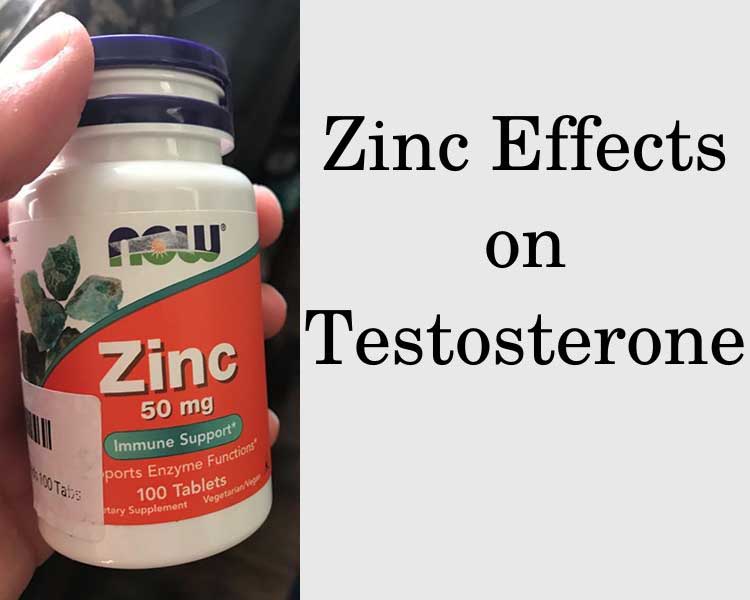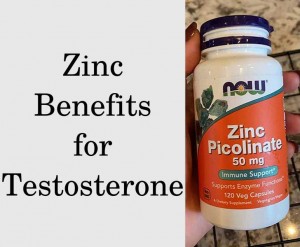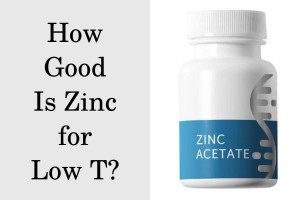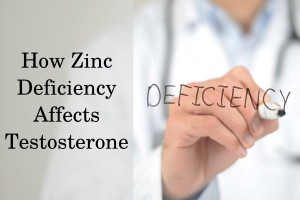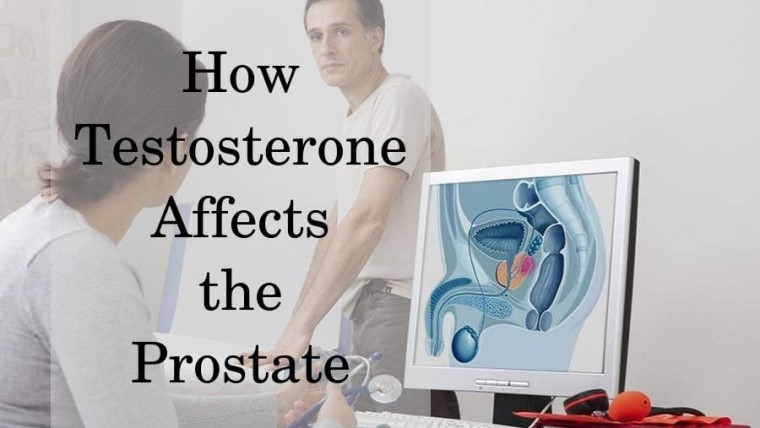In this article
The amount of zinc stored in your body is positively associated with your serum testosterone (T). Therefore, men who are zinc deficient may also have lower T levels.
If you are zinc deficient, then taking a zinc supplement can help boost your testosterone and help them return within the normal range.
However, if you are already consuming enough zinc, additional supplementation will not increase your T levels. That is true even in the case that you have low T due to other causes, such as male hypogonadism.
Therefore, neither healthy men nor men with low T will benefit from supplementation if there is no underlying deficiency.
If you have a deficiency, it is important to address it because low testosterone production is only one of the potential consequences.
Insufficient zinc intake can lead to other health problems, such as poor immunity, skin problems, impaired muscle growth, diarrhea, and more.
Does zinc increase testosterone?
Zinc may improve testosterone, DHT (Dihydrotestosterone), and sperm parameters in men with inadequate zinc intake.
Studies show that men who have severe zinc deficiency, such as those suffering from chronic disease, may experience a significant boost in testosterone after zinc supplementation.
For example, one study in zinc-deficient men who were on hemodialysis reported that supplementing with zinc sulfate for six weeks led to an 84% increase in testosterone levels.
However, it is essential to note that the patients were severely testosterone deficient both before and after the intervention.
Another study in infertile men reported an average of 54% increase in T after 40 days of supplementation with 120 mg of zinc sulfate twice per day.
Supplementation also improved their sperm parameters, and some of the infertile participants became fathers within three months.
Yet, zinc supplementation boosts testosterone levels only in cases of zinc deficiency. Studies in healthy men who have adequate zinc intake show that additional supplementation does not boost their T levels.
Best sources and forms of zinc
Zinc sulfate, used in most studies, is not the most well-absorbed form of supplementation. Zinc is absorbed better when it is bound to an organic molecule such as zinc picolinate, zinc citrate, zinc acetate, zinc glycerate, and zinc monomethionine.
Best dietary sources of zinc include seafood such as oysters, red meat, seeds, nuts, and fortified cereals. Oysters are highest in zinc, and two medium-sized oysters can provide you with more than 100% of your recommended daily intake.
How much zinc to take
Research shows that even modest amounts of zinc are sufficient to improve testosterone levels in men with low zinc intake.
A significant increase in T levels was observed after taking 250 mg of zinc sulfate per day for six weeks. This amount is equal to 50 mg of elemental zinc.
Most supplements usually contain 30-50 mg of elemental zinc, and 20-40 % of it gets absorbed in your gut which is enough to satisfy your daily needs.
Scientists have estimated that men need about 11 mg of zinc daily, while women require only 8 mg. The needs of the female organism increase up to 12 mg a day during pregnancy or lactation.
However, it is important to note that some of these recommendations may be outdated, and physically active men may have increased needs. Therefore, it may be better to consume anywhere between 15-20 mg of zinc on a daily basis.
Can zinc increase T in women?
Zinc supplementation may also provide benefits for women who are deficient in this mineral.
Studies in postmenopausal women report that taking a zinc supplement helped increase their testosterone levels and improved some of the sexual problems which are otherwise typical after menopause.
The supplementation improved their levels of libido and sexual satisfaction.
Zinc supplementation may also provide benefits for other hormone-related health problems in women.
According to several studies, zinc can also help reduce insulin resistance in women with PCOS, while those suffering from dysmenorrhea experience reduced pain during menstruation.
Can zinc be used for low T?
Unfortunately, zinc cannot be used for treating low T unless the condition is caused by zinc deficiency. Therefore, men with low testosterone due to male hypogonadism won’t be able to manage their condition & symptoms effectively with zinc supplementation.
Even if you consider taking zinc in doses that exceed the recommendations, it still won’t improve your testosterone levels if you have adequate zinc intake.
If you have a deficiency, then your body can tolerate high doses of zinc. However, people with adequate zinc levels should avoid taking more than 40 mg of elemental zinc per day.
Taking too much zinc can lead to gastrointestinal problems such as nausea and diarrhea. It may also lead to a reduction in your HDL levels (good cholesterol), and it helps slow down atherosclerosis.
Taking excessive amounts of zinc can also increase your appetite and may also disrupt your copper metabolism, thus inducing copper deficiency.
An effective treatment that can help manage the symptoms of low T in all forms of hypogonadism is testosterone replacement therapy (TRT). It involves the use of different types of testosterone that help restore your serum T levels.
Should you take zinc on TRT for better results?
Taking zinc alongside TRT is not likely to provide additional benefits to your condition.
Currently, there is evidence only from animal studies that zinc may help reduce the conversion of testosterone into estrogen, which is a process that naturally occurs in fat tissue under the effect of the aromatase enzyme.
However, the potential impact or benefits of supplementing zinc in men on TRT haven’t been studied yet.
Can zinc deficiency affect testosterone levels?
Zinc deficiency can have a negative impact on testosterone levels in men because it impairs the normal function of the testes.
Currently, the exact mechanism via this is unclear, but studies report that men with zinc deficiency often experience reduced levels of testosterone and other androgens such as DHT.
It may also have a negative impact on your semen parameters, such as your sperm count and motility.
What else can zinc deficiency cause?
Zinc deficiency may also lead to other symptoms depending on its severity.
Mild deficiencies usually lead to skin problems and affect the immune and digestive systems.
Men and women with zinc deficiency often complain of dry skin, acne, and thinning hair. You may also experience an increased incidence of infections, mouth ulcers, and reduced appetite.
Severe deficiencies can impair growth and development in children. Adults may experience rashes, chronic diarrhea, slower wound healing, and an increased risk of depression.
Unfortunately, blood tests are not always a reliable method to diagnose whether you have zinc deficiency or not because zinc is stored mainly inside your cells. Therefore, men with low zinc levels may have normal serum levels of the mineral.
What are other benefits men can expect from zinc?
Apart from increasing testosterone levels in the case of zinc deficiency, supplementation may also lead to additional benefits such as supporting immunity and wound healing.
It’s important to note that these positive effects occur primarily in otherwise zinc-deficient adults. Below you will discover them in order from the most to the least studied benefit.
Zinc supports the normal functioning of the immune system
Zinc plays a significant role in cell signaling, which is essential for the normal function of all cells in the body but especially the immune system.
Zinc deficiency can impair the normal function of the immune system and increase the risk of infections.
On the other hand, zinc supplementation can significantly reduce the symptoms or duration of certain viral infections, such as the human papillomavirus. Also, it can be an effective treatment for viral warts and lead to their complete disappearance in most patients.
Researchers also note that zinc may help reduce the risk or severity of common respiratory infections such as colds, although the effect is negligible.
Zinc is also effective in lowering the incidence of infection in older adults. According to one study, supplementing daily with 45 mg of elemental zinc reduced the risk of infections by 66% in elderly patients.
Zinc supports wound healing
Similarly to vitamin C, zinc also supports the normal formation of collagen. Collagen is the most abundant protein in the body, and it is the main component of the connective tissue that supports the integrity of your skin, bones, and internal organs.
That’s why about 5% of the zinc in your body is found in your skin cells.
Due to the beneficial role of zinc in collagen formation, researchers have also investigated its effects on wound healing, and studies show that supplementation is much more effective than a placebo in treating wounds such as diabetic foot ulcers.
Zinc may help reduce acne
People who are zinc deficient tend to have more and stronger exacerbations of acne compared to those with sufficient levels. Therefore, supplementation can reduce the severity of acne outbreaks in those patients.
Currently, there are not enough studies to reveal the exact way via which zinc helps reduce acne severity, but researchers suggest several mechanisms.
They include lowering inflammation, reducing the activity of the sebaceous glands, and suppressing the development of bacteria.


